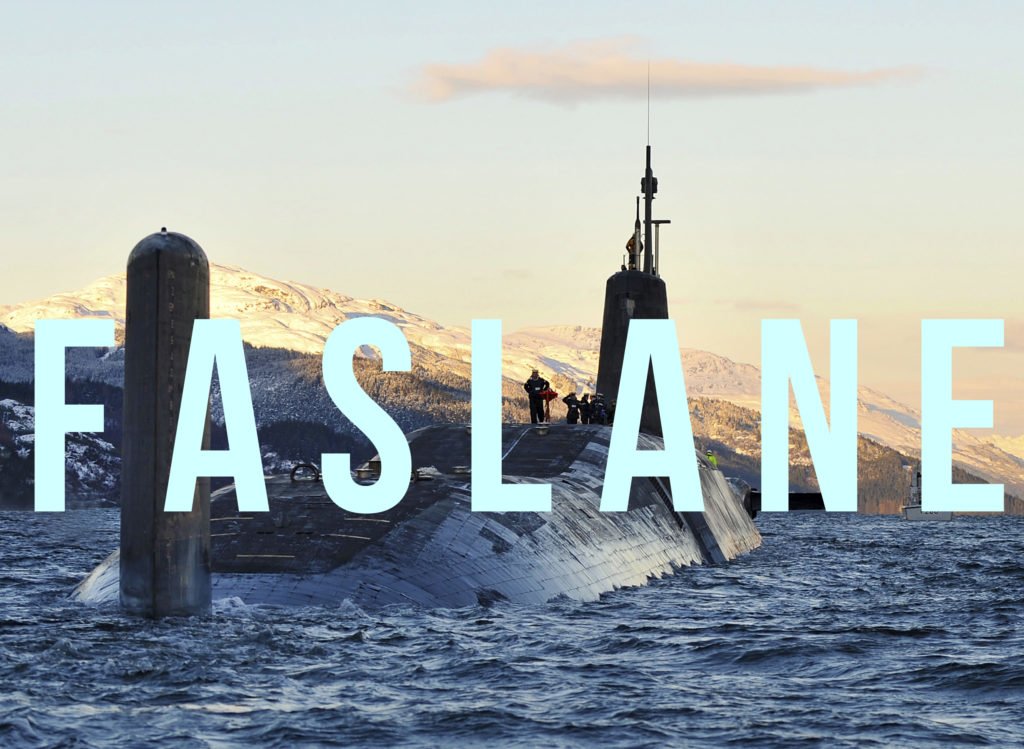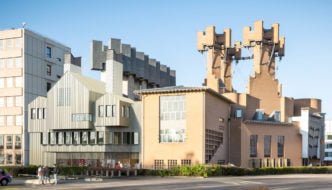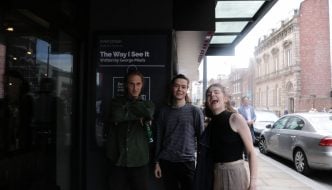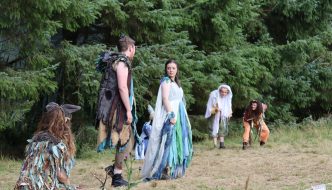Review: Jenna Watt’s Faslane at Contact Theatre
May 31, 2016

Photo Credit: Contact Theatre, Manchester
This month, Scottish theatre maker, performance artist and director Jenna Watt brought her piece Faslane to the stage of Manchester’s Contact Theatre as a preview for its performance at Edinburgh’s Fringe Festival later this year. Faslane is a piece of contemporary theatre centred on the polemical issue of the UK’s nuclear weapons programme Trident.
Perhaps most inspiring for me personally was Watt’s inquisitive determination to seek out information about Trident. Having realised in the run-up to the Scottish independence referendum in 2014 that she didn’t know where to stand on the central issue of Trident, Watt threw herself into a learning process interviewing key figures on both sides of the debate in various locations throughout the UK, for example coming to Manchester to meet representatives of Greater Manchester & District CND. At a time when near-constant internet use has given rise to ‘slacktivism’ or ‘armchair activism’ (of which I myself am undoubtedly guilty), her investigative initiative is something we could all learn from.
She starts her journey in the Trident base itself, a logical place to start, especially since anyone with any history of activism automatically sees themselves on a blacklist prohibiting their entry. The officials and engineers don’t give her particularly nuanced responses regarding her questions about the necessity of Trident, ranging from vaguely asserting, “It gives us a seat at the table”, to simply, “I don’t know, it’s just my job.” Peculiarly, she finds the peace camp residents similarly lacking in vigour. “Why do you live in the peace camp?” she asks, anticipating an impassioned declaration of dedication to a life living, eating and breathing all that is anti-nuclear. “Personal reasons, you know,” is the response she gets.
The piece is intended to create a space for open and thoughtful debate about an issue which is so often polarised. Watt isn’t telling us what to believe. Rather, she presents both sides of the debate, giving ambivalent viewers a chance to share the information she has collated and allowing those with stronger convictions to take a glimpse into the other side of the debate, without feeling the pressure to defend their own position. Interspersed with the reconstructions of interviews are representations of Watt’s internal monologue, wavering as she struggles to reconcile the two sides of what she’s heard. A microphone, suspended from above, swings from one side of the stage to another. She catches it, “Well, we need Trident because it give the UK a seat at the table.” It swings to the other side as Watt runs and catches it, “What fucking table?!”
The turning point for Watt and the play is found in the humanisation of the massive destruction inherent in nuclear weapons, the tragedy of which is too often downplayed in debate. Even the knowledge that Trident has the destructive capacity equal to 7680 Hiroshimas does little to illuminate the sheer scale of human suffering behind the use of such weapons. With Hiroshima’s death toll estimated around 146000, those obliterated by the initial blast were at least spared the inconceivable horrors that ensued, as those who somehow survived despite horrific injuries dragged their skinless and bleeding bodies around the hellscape that had been Hiroshima moments before. The effects of radiation sickness continue to be seen until this day, inducing diseases such as Leukemia, cancer and keloids – burn-like scars which swell and develop rather than heal. Times that by 7680, and that’s around the scale of destruction Trident is capable of.
And now Watt is on a blacklist, having attended protests and engaged in other forms of anti-nuclear activism. Seeing nuclear weapons as ultimately a humanitarian issue, her piece Faslane is a call for more conversations about the topic. She’ll be bringing it to Edinburgh Fringe Festival later this year as well as touring Scotland in Spring 2017 and potentially also the North in the future. Some of this will entail bringing the piece to non-theatre spaces and thereby opening up the discussion to those less likely to use specifically cultural spaces. Be sure to catch it if you can.
Faslane was part of Contact’s annual festival Flying Solo, celebrating the art of solo performance.
Filed under: Politics, Theatre & Dance
Tagged with: Contact Theatre, debate, Faslane, female performer, flying solo, Jenna Watt, manchester, Performing arts, solo performer, theatre, Trident



Comments